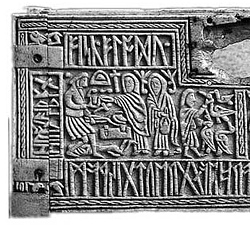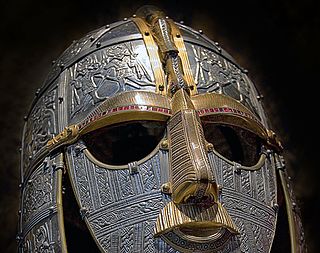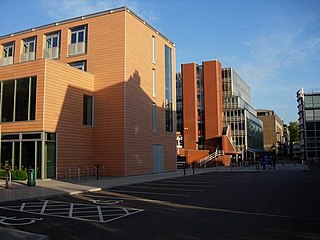
Anglo-Saxon paganism, sometimes termed Anglo-Saxon heathenism, Anglo-Saxon pre-Christian religion, or Anglo-Saxon traditional religion, refers to the religious beliefs and practices followed by the Anglo-Saxons between the 5th and 8th centuries AD, during the initial period of Early Medieval England. A variant of Germanic paganism found across much of north-western Europe, it encompassed a heterogeneous variety of beliefs and cultic practices, with much regional variation.
Martin Oswald Hugh Carver, FSA, Hon FSA Scot, is Emeritus Professor of Archaeology at the University of York, England, director of the Sutton Hoo Research Project and a leading exponent of new methods in excavation and survey. He specialises in the archaeology of early Medieval Europe. He has an international reputation for his excavations at Sutton Hoo, on behalf of the British Museum and the Society of Antiquaries and at the Pictish monastery at Portmahomack Tarbat, Easter Ross, Scotland. He has undertaken archaeological research in England, Scotland, France, Italy and Algeria.

Helen Mary Geake is a British archaeologist and small finds specialist. She was one of the key members of Channel 4's long-running archaeology series Time Team.
Sarah Rosamund Irvine Foot is an English Anglican priest and early medieval historian, currently serving as Regius Professor of Ecclesiastical History at the University of Oxford.
Barbara Yorke FRHistS FSA is a historian of Anglo-Saxon England, specialising in many subtopics, including 19th-century Anglo-Saxonism. She is currently emeritus professor of early Medieval history at the University of Winchester, and is a fellow of the Royal Historical Society. She is an honorary professor of the Institute of Archaeology at University College London.
Howard M. R. Williams is a British archaeologist and academic who is Professor of Archaeology at the University of Chester in England. His research focuses on the study of death, burial and memory in Early Medieval Britain.

The Anglo-Saxon settlement of Britain is the process which changed the language and culture of most of what became England from Romano-British to Germanic. The Germanic-speakers in Britain, themselves of diverse origins, eventually developed a common cultural identity as Anglo-Saxons. This process principally occurred from the mid-fifth to early seventh centuries, following the end of Roman rule in Britain around the year 410. The settlement was followed by the establishment of the Heptarchy, Anglo-Saxon kingdoms in the south and east of Britain, later followed by the rest of modern England, and the south-east of modern Scotland.
Martin Biddle, is a British archaeologist and academic. He is an emeritus fellow of Hertford College, Oxford. His work was important in the development of medieval and post-medieval archaeology in Great Britain.
Warwick James Rodwell is an archaeologist, architectural historian and academic. He was lately Visiting Professor in the Department of Archaeology, University of Reading, and is Consultant Archaeologist to Westminster Abbey, where he is also a member of the College of St Peter in Westminster. He is the author of many books and articles, including the standard textbook on church archaeology. He is a Fellow of the Society of Antiquaries of London, the Society of Antiquaries of Scotland and the Royal Historical Society.

The Department of Anglo-Saxon, Norse and Celtic is one of the constituent departments of the University of Cambridge, and focuses on the history, material culture, languages and literatures of the various peoples who inhabited Britain, Ireland and the extended Scandinavian world in the early Middle Ages. It is based on the second floor of the Faculty of English at 9 West Road. In Cambridge University jargon, its students are called ASNaCs.
Helena Francisca Hamerow, FSA is an American-born archaeologist, best known for her work on the archeology of early medieval communities in Northwestern Europe. She is Professor of Early Medieval archaeology and former Head of the School of Archaeology, University of Oxford.
Edward Thurlow Leeds was an English archaeologist and museum curator. He was Keeper of the Ashmolean Museum from 1928 to 1945.
Audrey Lilian Meaney was an archaeologist and historian specialising in the study of Anglo-Saxon England. She published several books on the subject, including Gazetteer of Early Anglo-Saxon Burial Sites (1964) and Anglo-Saxon Amulets and Curing Stones (1981).

Anglo-Saxon Deviant Burial Customs is an archaeological study of atypical burial practices in Anglo-Saxon England. It was written by the English archaeologist Andrew Reynolds of the UCL Institute of Archaeology, based on the work which he had undertaken for his PhD, completed in 1998. The book was first published by Oxford University Press in 2009 as a part of their series on "Medieval History and Archaeology", edited by John Blair and Helena Hamerow.
Dame Rosemary Jean Cramp, is a British archaeologist and academic specialising in the Anglo-Saxons. She was the first female professor appointed at Durham University and was Professor of Archaeology from 1971 to 1990. She served as President of the Society of Antiquaries of London from 2001 to 2004.
William John Blair, is an English historian, archaeologist, and academic, who specialises in Anglo-Saxon England. He is Emeritus Professor of Medieval History and Archaeology at the University of Oxford, and a Fellow of The Queen's College, Oxford. He gave the 2013 Ford Lectures at the University of Oxford.
James Campbell, was a British historian, specialising in the medieval period and the Anglo-Saxons. He was a Fellow of Worcester College, Oxford, from 1957 until his retirement in 2002, and Professor of Medieval History at the University of Oxford from 1996 to 2002.

Sonia Chadwick Hawkes, was a leading specialist in early Anglo-Saxon archaeology, described as a "discerning systematiser of the great array of Anglo-Saxon grave furnishings". She led major excavations on Anglo-Saxon cemeteries at Finglesham in Kent and Worthy Park in Hampshire.
Tania Marguerite Dickinson is a British archaeologist specialising in early-medieval Britain. Dickinson undertook undergraduate study at St. Anne's College, Oxford and postgraduate study at the Institute of Archaeology (Oxford). Her doctoral thesis, titled The Anglo-Saxon burial sites of the upper Thames region, and their bearing on the history of Wessex, circa AD 400-700, was supervised by Sonia Chadwick Hawkes and Christopher Hawkes.
Dawn Marie Hadley is a British historian and archaeologist, who is best known for her research on the Anglo-Saxon and Viking-Age periods, the study of childhood, and gender in medieval England. She is a member of the Centre for Medieval Studies and the department of archaeology at the University of York.





